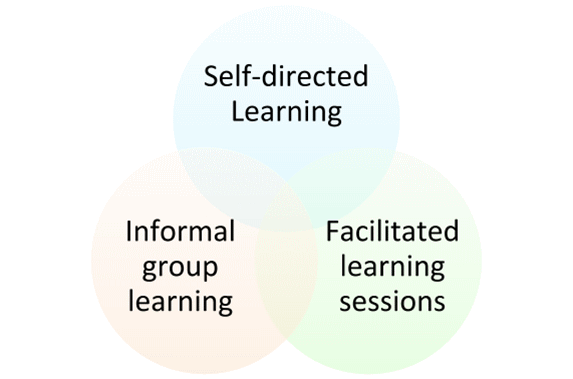How to use the online resource alone and within your team to achieve Enhanced dementia practice in the context of your role.
You can use the resource in the way that suits you. You can use it alone, to develop your own knowledge and skills, and in facilitated or informal team learning sessions. You should always discuss your own learning with others to broaden your experience, to critically discuss complex ideas and to appreciate different perspectives and experiences.
Before you begin the resource we recommend you first examine the learning outcomes within each section to establish existing strengths as well as key learning needs.
The key resources and activities that appear throughout the sections will play a key part in enabling you to develop and reflect on the knowledge, skills and values that are essential for practising at the Enhanced level of the Promoting Excellence framework.
We have put together some examples to support you to understand how this learning fits into your overall way of working. We have also included references to some related Codes of Practice from relevant professional bodies.

Remember - whichever approach you favour, we recommend that you include an element of group learning.
Using the online resource in self-directed learning
As part of individual study, you might like to explore each section's key resources and then reflect on the scenarios and activities in relation to your own practice.
How?
- save answers and reflections on the activity questions as a personal and professional record of development
- share reflections and learning with someone who has the capacity to discuss or give advice, such as a peer mentor or line manager.
Using the online resource in facilitated learning sessions
After some preparatory reading of the key resources, you can view and discuss the dramas, personal stories, case studies and activities in formal facilitated learning sessions. Someone who is familiar with the online resource and skilled at facilitating the learning of others should lead this.
How?
- in dedicated learning and development sessions for inspection teams
- within in house dementia training, perhaps as part of an induction to an inspection role.
Using the online resource in informal group settings
You can view or discuss the resource in less formal learning settings, where there is an opportunity for a 'bite sized' approach to learning that suits the work environment. Drama and personal stories can be viewed, or the written transcript and case studies can be used to aid discussion. The mobile version of the learning resource will also enable the use of tablet devices and smart phones.
How?
- in discussion groups with colleagues at team meetings, workshops or study sessions
- as part of individual or group supervision.
The SSSC Codes of Practice for Social Service Workers states:
6 - As a social service worker you must be accountable for the quality of your work and take responsibility for maintaining and improving your knowledge and skills.
This includes:
- 6.1 Meeting relevant standards of practice and working in a lawful, safe and effective way
- 6.8 Undertaking relevant training to maintain and improve your knowledge and skills and contributing to the learning and development of others.
The Nursing and Midwifery Council, The Code for Nurses and Midwives states:
9 - Share your skills, knowledge and experience for the benefit of people receiving care and your colleagues.
To achieve this, you must:
- 9.1 provide honest, accurate and constructive feedback to colleagues
- 9.2 gather and reflect on feedback from a variety of sources, using it to improve your practice and performance
- 9.3 deal with differences of professional opinion with colleagues by discussion and informed debate, respecting their views and opinions and behaving in a professional way at all times, and
- 9.4 support students' and colleagues' learning to help them develop their professional competence and confidence.
Using this resource can support you or your team with:
- developing an organisational approach to the implementation and embedding of the Standards of Care for Dementia in Scotland and Promoting Excellence: a framework for all health and social service staff working with people with dementia
- inter-agency and multi-disciplinary joint learning
- developing essential knowledge and skills as part of an induction into an Enhanced practice role
- supporting the learning of others, including colleagues and other social service workers in the services you inspect
- evidencing on-going professional development in line with SSSC or other professional body Codes of Practice
- demonstrating post registration training and learning to uphold registration with the SSSC or other professional body, for example for an adult support and protection requirement
- generating evidence of strong personal capability within the Continuous Learning Framework and validating and improving the quality of individual practice
- the development of a portfolio of evidence to work towards post qualifying awards.
We want to hear from you
We are keen to find out how you are using the online resource and what difference it has made to your team as one means of supporting dementia learning and development and service improvement.
We would also welcome suggestions from those using the resource about how it can be improved in the future.
If you wish to get in touch with us please contact: promotingexcellence@sssc.uk.com



